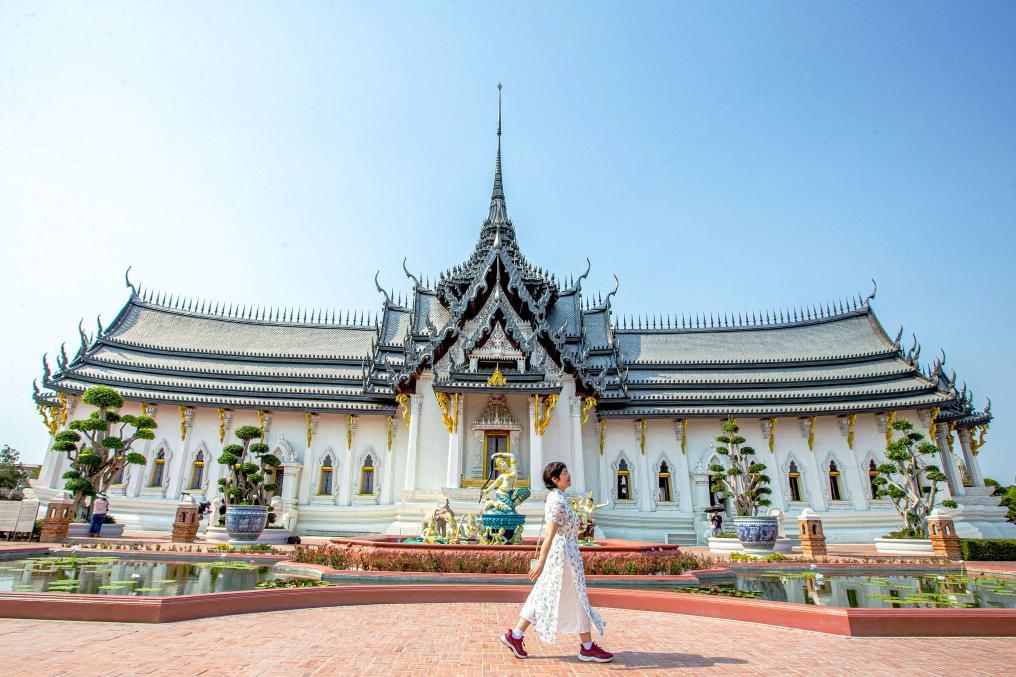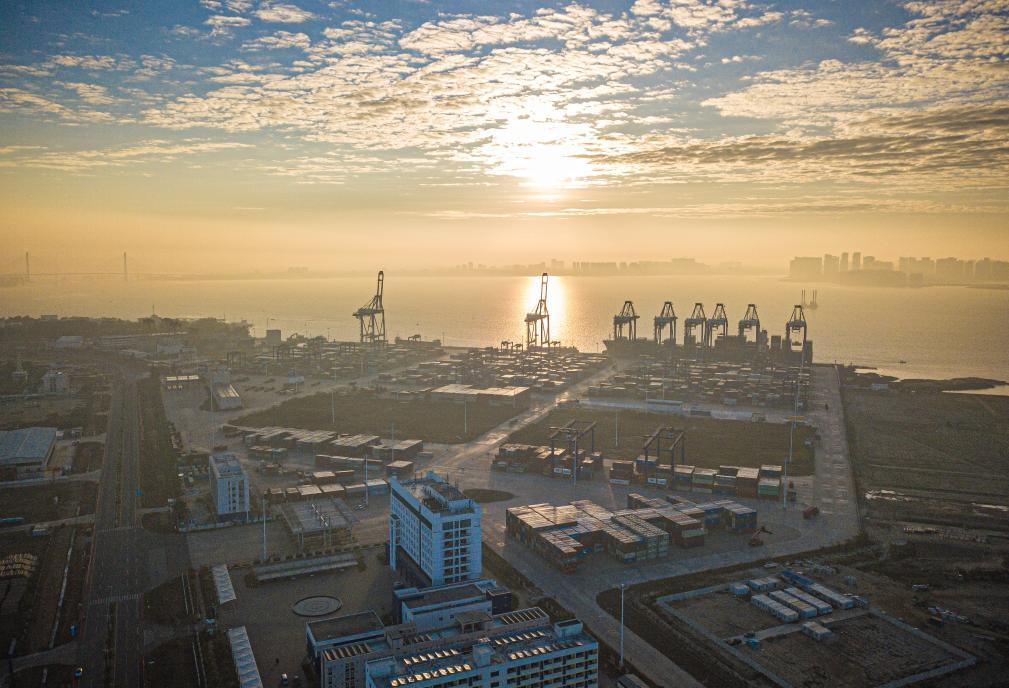BEIJING, March 2 (Xinhua) -- The upcoming annual sessions of China's top legislature and political advisory body will offer the world a window to observe the country's development and understand its policy direction for the following year.
The second session of the 14th National People's Congress (NPC) and the second session of the 14th National Committee of the Chinese People's Political Consultative Conference (CPPCC) will open on March 5 and 4, respectively.
The year 2024 marks the 75th anniversary of the founding of the People's Republic of China and is a crucial year for the realization of the goals and tasks of the 14th Five-Year Plan (2021-2025). In such a significant year, what issues are especially worthy of attention at the "two sessions"? Here are some advices.
People work at the press center for China's upcoming annual legislative and political consultative sessions in Beijing, capital of China, Feb. 27, 2024. [Photo by Li Xin/Xinhua]
ECONOMIC GOALS
At the "two sessions" each year, the annual economic development goals of the world's second-largest economy are among the most anticipated announcements.
The development goals for 2024 are expected to be unveiled in the government work report, which will be deliberated at the NPC's annual session. The report usually includes the country's targets on gross domestic product (GDP) growth, inflation, the ratio of deficit to GDP, employment, and foreign trade and investment, among others.
Last year, the Chinese economy rebounded for the better, high-quality development was solidly advanced, important progress had been made in the construction of a modern industrial system, and the foundation for safe development was consolidated.
China's provincial-level regions recently unveiled their growth targets for 2024 in government work reports delivered to local people's congresses. Their 2024 GDP growth targets vary from 4.5 percent to 8 percent, with the majority expecting to expand their economy by over 5 percent.
"The economic goals should be both in line with our development potential and within an appropriate range, and more importantly, it should give priority to the quality of growth," said Han Baojiang, professor of the Party School of the Communist Party of China (CPC) Central Committee (National Academy of Governance) and a national political advisor.
An aerial drone photo taken on Jan. 8, 2024 shows robotic arms processing parts for new energy vehicles at a private company in Changxing Economic and Technological Development Zone, Huzhou City, east China's Zhejiang Province. [Photo by Tan Yunfeng/Xinhua]
NEW GROWTH DRIVERS
"New productive forces," an emerging catchphrase in China's policymaking, is expected to be a hot topic garnering much attention.
The concept refers to a new form of productive forces derived from continuous sci-tech breakthroughs and innovation that drive strategic emerging industries and future industries in a more intelligent information era.
The Central Economic Work Conference, held late last year to chart economic development in 2024, said China would "promote industrial innovation through technological innovation... to foster new industries, new models and growth drivers, and develop new productive forces."
"New productive forces are crucial to promote self-reliance in high-level science and technology," said Yuan Yuyu, NPC deputy and chairman of Medprin Regenerative Medical Technologies Co., Ltd, adding that his focus at the "two sessions" will be how to strengthen sci-tech innovation, especially original and disruptive innovation.
A Chinese tourist visits Ancient Siam in Samut Prakan, Thailand, March 1, 2024. In late January, China and Thailand signed an agreement on mutual visa exemption which took effect on March 1. [Photo by Wang Teng/Xinhua]
HIGH-LEVEL OPENING UP
China's attitude and plans concerning its opening up are among the most closely watched in the world.
At the Central Economic Work Conference, China pledged to expand high-level opening up and reinforce the stable performance of foreign trade and foreign investment.
A series of recent policy measures sent a clear signal that China is firmly committed to expanding opening up. For example, the country announced that it will remove all restrictions on foreign investment access in the manufacturing sector, and five new measures are already facilitating the entry of foreign nationals into China for business, education and tourism.
Zhang Junkuo, a national political advisor and former deputy director of the Development Research Center of the State Council, said amid rising anti-globalization sentiment and intensifying geopolitical tension, "it is particularly important for China to respond to uncertainties in the external environment with its certainty in opening up."
This photo taken on Sept. 2, 2023 shows a quantum computer displayed during the 2023 China International Fair for Trade in Services (CIFTIS) in Beijing, capital of China. [Photo by Ren Chao/Xinhua]
REFORMS IN KEY AREAS
Advancing reforms in key areas and crucial sectors will also be a focus of attention for national lawmakers and political advisors.
Accelerating the building of a unified national market is a concern of Jin Li, a national political advisor and vice president of Southern University of Science and Technology.
"It's important to break down local protectionism and market segmentation," Jin said, calling for accelerating the establishment of unified market institutions and rules in such terms as property rights protection, market access and fair competition.
Many are also concerned about further boosting the confidence of private enterprises.
Gao Zicheng, NPC deputy and president of the All China Lawyers Association, said it was necessary to further optimize the development environment and stimulate internal driving forces and the innovation vitality of private enterprises.
An aerial drone photo taken on Jan. 1, 2024 shows the Yangpu international container terminal in south China's Hainan Province. [Photo by Pu Xiaoxu/Xinhua]
WHOLE-PROCESS PEOPLE'S DEMOCRACY
The "two sessions" displays China's whole-process people's democracy in action, as national legislators and political advisors -- ranging from farmers to state leaders -- gather in Beijing to deliberate on bills or discuss the affairs of the state.
This year also marks the 70th anniversary of the founding of the NPC and 75th anniversary of the founding of the CPPCC.
The people's congress system is a foundational political system for upholding the unity between leadership by the CPC, the running of the country by the people, and law-based governance.
The CPPCC is an important organ for multi-party cooperation and political consultation led by the CPC. It is a major channel for socialist consultative democracy and a specialist consultative body.
(Video reporters: Cao Li, Li Shuai, Mei Yuanlong, Fang Yadong, Yan Rui, Zhao Yuhe, Yuan Xun, Zhang Mengjie, Liu Yuxuan, Su Chuanyi, Sun Shaoxiong; Video editors: Yang Zhixiang, Li Qin)

 中文
中文








